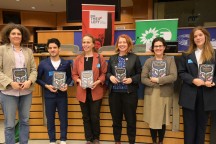
Andrea Tompa's speech in the EP at the presentation of A Fairytale for Everyone

Andrea Tompa's Facebook post and speech at the European Parliament, at the presentation of the 11 language editions of A Fairytale for Everyone, on November 15, 2022
The event was initiated by Swedish EP representative Malin Björk. She started her introduction by saying that she is Swedish, an MEP and a lesbian. And the ceiling didn’t come off.
One of Hungary’s 21 EP representatives, Attila Ara-Kovács, came, we thank him. The other representatives weren’t interested in us, they didn’t even say hello, neither did the opposition.
My speech can be read below. I talked about the fact that 1. a writer has nothing to do in a parliament anyway; 2. except in an extraordinary situation; 3. Fairyland was an extraordinary situation; 4. even the opposition did not object to the book shredding; 5. however, stories shape the world, and these are stories, i.e. fairy tales; 6. the volume also resulted in a lot of solidarity and created a movement; 7. storytelling teaches you when to speak and when to listen/listen to others.
(Mária Takács shot a documentary, so there will be a serious work about this whole trip.)
In the picture, in a row: Boldizsár Nagy, the editor of the volume, Gwendoline Delbos-Corfield, EP representative, who writes reports about Hungary, Malin Björk, EP representative, myself, Rebeka Horváth, an author of the volume, and Dorottya Rédai, the project manager of the volume. We all talked.

As the author of this volume, I thank you for this invitation and this opportunity to talk to you. As a writer, it feels special to be standing here. Perhaps it is only in an extraordinary situation that a writer can speak in a parliamentary setting. But the situation is extraordinary. We wouldn't be here if a Member of the Parliament in Hungary hadn’t destroyed, hadn’t literary shredded this fairytale book publicly. This MP did not criticize, did not even express anger or disagreement toward the book, but – In a gesture reminiscent of a painful past – this MP tore the book down. In doing so, that person gave others the authority to do this to a book, as if the past when books were burnt did not happen or matter anymore. And yes, it happens again and again: this year, on the night of the elections, someone wrote me a letter saying that they had thrown my novels away after I had posted on social media my opinion about the elections.
This story has shaken us all to the core. Not only I was astonished as a writer whose work was symbolically destroyed, but also as a writer whose family model, represented by the story I wrote, was also destroyed. And all those lives and family models to which this book is dedicated to were symbolically destroyed by such a gesture.
But even more I am still sad when I think of this event that other fellow politicians, MPs, from both government and opposition sides did not express astonishment, did not condemn publicly such a gesture. Did not distance themselves from the harmful tradition of burning, destroying books. Silence of our leaders is also harmful because it is complicity.
I am happy and very proud, along with my colleagues, to be among you here. But we shouldn’t be here. The destiny of this book should have been what we all worked for: a storybook to be read, in community, at home, with caring parents, a book talked and discussed in an intimate situation by a child and his parent or a teacher. A story of us who have many kinds of hard or easy or complex lives.
This book, like literature in general, wanted nothing else than show that the world is complex, that man is a complicated creature, and that we all, just like our heroes, are constantly learning how we should deal with life. This storybook should be nothing more than one of many books that a family that values the importance of children learning about this complexity of the world reads together.
This book, however, has grown beyond the bounds of family and community reading. And it became what stories often become: it began to shape the world.
A Fairytale for everyone has become a cause and a symbol. A symbol of a world in which people are diverse and lead diverse lives, and their struggles is grounded in reality. It has grown into a large movement of solidarity, too.
There is also this Hungary, which we should all make more visible and get to know, a country of solidarity, of inclusion, of interest in the other. Maybe even a country of love – I prefer to use the word of love instead of tolerance. Perhaps this Hungary it is not always visible from a distance.
For a writer it is a very unusual experience that stories can have such a power to shake the world. Storytelling is words. Storytelling is talking, reading. Storytelling means also breaking the silence. This is what this little, at the beginning completely unnoticed book did. Thank you for giving us here today the opportunity to speak. This is what we all should learn doing better: to speak when necessary, to be silent and to listen to others. Thank you.

